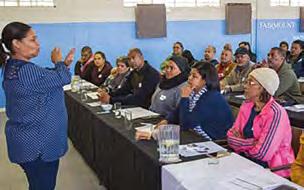
11 minute read
Mining
Vanadium is finding new value in batteries.
Pilanesberg Platinum Mines created Community Crusher as a non-profit enterprise but with 14 employees and a steady set of orders for building projects run by the company, the small business is showing the potential to become a bigger business.
Advertisement
Many mines run similar programmes, sourcing goods and services from local community-based companies and sometimes providing mentoring and advice on how to improve as businesses.
Impala Platinum (Implats) has a programme of procurement in which it supports local business and black-owned businesses through enterprise and supplier development programmes.
Pilanesberg Platinum Mines has been active 80km north-west of
Rustenburg for just over ten years. Mining operations are conducted by contractors while PPM manages the concentrator (screen, crush, mill, float, thicken and dry). The operation has annually achieved an average of about 150 000 ounces of platinum group metal (PGM) concentrate.
The Provincial Government of the North West is in talks with several mining companies in the Matlosana Local Municipality area (which includes Klerksdorp and Orkney) as some mines are being closed down. One of the initiatives to extract more value from mining is the proposed Platinum Valley Special Economic Zone. Creating a base for companies to supply the mining industry is one of the key drivers behind the scheme.
The SEZ is intended for Mogwase in the Bojanala District, north of
Rustenburg and east of Sun City. When fully developed, 200ha of land will be taken up by three infrastructure facilities comprising Logistics,
Light Manufacturing and Heavy Manufacturing.
The Seda Platinum Incubator (SPI) is an initiative of the
Platinum Trust of South Africa and is funded by the Small Enterprise
Development Agency (Seda) through its Seda Technology Programme (Stp) with the support of the North West Provincial Government and private companies.
Mining news
Several mining companies are investigating energy – both in order to power their own operations because of the risk of the national utility failing to supply electricity, and to find new uses for platinum.
Bushveld Minerals has two arms; Bushveld Vanadium and Bushveld Energy which is working on Vanadium Redox Flow Batteries (VRFB). Energy storage is the focus of much research across the globe and Bushveld Energy intends its solar installation at its Vametco mine, supported by VRFB, to answer many questions. Bushveld Vanadium is one of three vanadium producers in the world.
Sibanye-Stillwater has renamed the mining operation it bought from Lonmin in 2019, Marikana. The sale was completed in June 2019. This is SibanyeStillwater’s second major purchase of platinum assets in the North West, after buying Anglo American’s Rustenburg Platinum Mines Limited.
Between the fourth quarter of 2018 and the fourth quarter of 2019 the global price of platinum slumped, but a later surge in the price of other PGMs such as palladium and rhodium offset this downturn. The fact that the mining industry continued to operate through most of the lockdown that accompanied the Covid-19 outbreak helped to bring some stability back to the sector.
In early 2020 rhodium rose to its highest price since 2008,
Image: Bushveld Minerals Sector Insight A CSI project is turning into a viable business.
NEW WIMSA CHAIRPERSON RAISES THE BAR
Selected as one of the “Top 100 Global Inspirational Women in Mining” by Women in Mining UK in 2018, Thabile Makgala was recently appointed to the position of Chairperson of Women in Mining South Africa (WiMSA). Thabile holds the position of Executive: Mining at Impala Platinum but getting to the top was no easy journey. Thabile recalls “numerous obstacles while navigating my mining career path”.
Her qualifications include a Master’s degree in Business Administration from the University of Stellenbosch Business School and a Bachelor of Science degree in Mining Engineering (Cum laude), from the University of the Witwatersrand. But as the first female mining engineer graduate at Goldfields Kloof and Driefontein division (now Sibanye Gold), it soon became clear that, as she recalls, “the industry had not adequately prepared itself to accept women in mining”.
“The response to women’s needs (infrastructure, personal protective clothing and policies) was slow and very little was in place to address women’s issues.”
Her extensive experience has given Thabile insight into what is needed. “Women and men should hold equal representation in the workplace,” she says, “and mining companies should prioritise and advocate for diversity, inclusion, parity and for greater recognition of female leadership within their organisations.”
Thabile is encouraged by progress made by women in mining but wants to see “more deliberate and proactive action”. Her hope is that in 10 years, “the fundamental elements such as empowering, caring, showing respect, connecting and growing our female talent, would have been achieved”.
$8 200/oz, and palladium achieved a new record high of nearly $2 150/oz. Some mining companies discovered that several of the other minerals that are present in their mines (gold, copper and nickel) were surging in price, causing them to investigate ramping up operations.
Some companies chose to sell assets while others have undergone major restructuring. Impala Platinum will spend R2.7billion over two years to scale down production from 11 shafts to six lower-cost, profitable, shafts. In FY2018 Impala produced 580 800 ounces of refined platinum. Impala Refinery Services (IRS) smelts and refines concentrate and matte and recycles auto catalysts.
The mining sector still makes a big contribution to provincial GDP although that percentage is now below 30%. About 18% of total employment in the province is in mining. Mineral resources
The North West Province is aligned with the Western Limb of the Bushveld Igneous Complex, a remarkably rich minerals formation. Mines in the province produce 50% of the platinum produced in the world, and 65% of South Africa’s PGMs. Chromite is the other major mineral mined throughout the province, and there are several ferrochrome smelters and other processing plants. South Africa produces about 70% of the world’s chrome. Gold and uranium are found along the border of the province with Gauteng and the Free State (in Klerksdorp and Orkney). Diamonds are mined at Christiana, Bloemhof and Lichtenburg. Other minerals include fluorspar, vanadium, rhodium, uranium, copper, limestone, slate, phosphate, manganese, coal and nickel. Limestone quarries run by G&W Base and Industrial Minerals in the Marico District are located next to a PPC cement factory.
One of the last economically viable limestone deposits in South Africa is mined and processed by Sephaku Cement. Sephaku runs a 6 000-ton-per-day clinker plant near Lichtenburg. AfriSam, PPC and Lafarge are active in the Mahikeng/Lichtenburg area, but Sephaku is confident that its clinker and cement-production facilities will be supported by raw materials for at least 30 years. AfriSam has taken measures to reduce carbon emissions at its Dudfield cement plant. ■ Online Resources
Geological Society of South Africa: www.gssa.org.za Minerals Council South Africa: www.mineralscouncil.org.za National Department of Mineral Resources: www.dmr.gov.za North West Development Corporation: www.nwdc.co.za
Delivering opportunities in local communities
Implats spent R1.6-billion supporting local businesses in 2019.
Implats’ enterprise and supplier development activities focus on supporting local and black businesses and are designed to contribute to socio-economic development in neighbouring communities, build a more robust and competitive supply chain for the Implats Group, and ensure compliance with regulatory expectations.
Enhancing procurement opportunities is important to create sustainable communities, improve community relations and advance the economic development of these areas.
Implats’ preferential procurement practices and enterprise and supplier development activities make a tangible difference to the lives and families of emerging black entrepreneurs and stimulate economic development in our host communities.
In 2019, Implats’ South African operations made good progress on increasing levels of localised and preferential procurement. Local-to-site procurement increased to 23% of total spend, amounting to R1.6-billion. Implats strives, as far as possible, to source all goods and services within South Africa, with an emphasis on local businesses.
Since 2013, Implats has provided support to 41 local black-owned businesses through two principal initiatives – Aurik and Raizcorp – and helped grow its monthly spend with 28 of these businesses by more than 60%. Supporting local and black-owned businesses through preferential procurement is an important part of promoting transformation and Implats undertakes the following activities to develop entrepreneurial skills: • Seeking, identifying, supporting and promoting appropriate historically disadvantaged suppliers through sustainable procurement practices. • Leveraging the existing supplier base to unlock local employment opportunities, mentorship and investment in the greater value chain. • Nurturing an environment for partnerships and joint ventures between the existing supplier base and local entrepreneurs. • Striving to improve year-on-year BEE spend relative to the requirements of the Mining Charter and reporting in parallel on
B-BBEE performance as per the Department of Trade, Industry and
Competition’s Codes of Good Practice.
In 2020 Implats aims to increase the scale of working partnerships between the South African government and large and small suppliers.
Further, our investment in the accommodation and living conditions of employees is one pillar of Implats’ contribution to the wellbeing of its host communities. Our social investment strategy complements this by providing schools, clinics and other amenities.
Social programmes and investments are identified in collaboration with stakeholders in the areas in which we operate and seek to address identified community needs by focusing on infrastructure, health, education, community employment and empowerment initiatives. ■

By Empowering our People.
People are the foundation on which exceptional performance is built and Implats are committed to developing and empowering these people.
Promote access to affordable and effective healthcare
Investment and development of clinics
R60 EMPOWERMENT THROUGH EDUCATION million
spent on adult literacy programmes in the last 5 years
EMPOWERING LOCAL COMM U N I T I E S THROUGH INFRASTRUCTURE & SOCIO-ECONOMIC DEVELOPMENT Joint ventures Recognised leaders in the mining industry in improving living conditions Apprenticeships and learnership programmes & investment in the with local development of schools entrepreneurs FOCUSEMPOWERMENT THROUGH HEALTH A HIV/Aids counselling, testing and wellness programme N D WELLBEING

R9.2 billion
discretionary procurement spend in 2019
Over R4 billion
Local SMMEs and black-owned businesses supported CR E A T M P E O WERMENT THROUGH DEVELOPING TALENT AND LEADERSH I Pspent in the last 3 years improving learning environments by development and advisory programmes I N G AN ENVIRONMENT FOR SUSTAINABLE BUSINESS OPPORTUNITIES R33 million invested in through school support improving housing programme since 2007 R465 million
We are committed to ensuring our people contribute to and benefit from our success
invested in skills development in 2019
Sibanye-Stillwater is committed to contributing towards the socio-economic development of the North West Province.
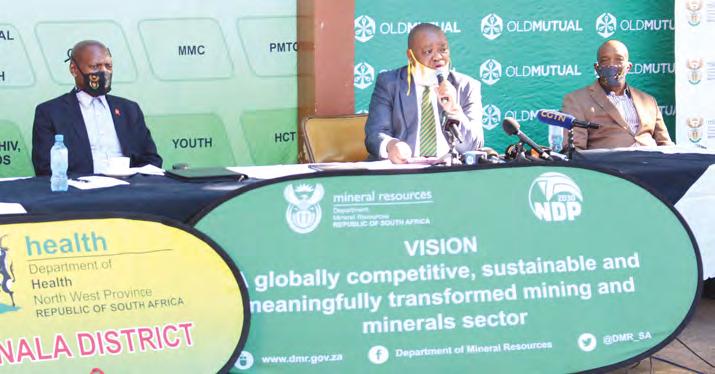
Above (left to right): Dr Zweli Mkhize (Minister of Health), Gwede Mantashe (Minister of Mineral Resources and Energy) and Job Mokgoro (North West Premier) receiving the donation of PPE for frontline health workers.
Sibanye-Stillwater is a leading international precious metal mining company, with a diverse portfolio of platinum group metal (PGM) and gold operations and projects. It is the world’s largest primary producer of platinum and rhodium, the second- largest primary producer of palladium and the third-largest producer of gold (on a gold-equivalent basis). Sibanye-Stillwater is also the leading global recycler and processor of spent PGM catalytic converter materials.
With its Rustenburg and Marikana mining operations in the North West providing employment to 44 000 workers in the region, Sibanye-Stillwater is a significant contributor to the socio-economic development of the North West Province.
In addition to taxes, royalties and wages, the company contributes to the development of small and medium enterprises through its inclusive procurement and enterprise development programme. It also contributes to micro enterprises
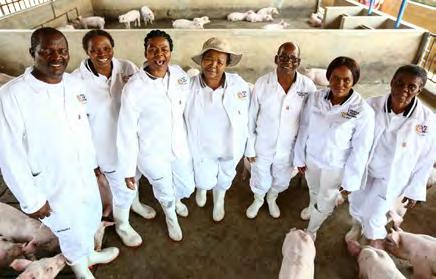
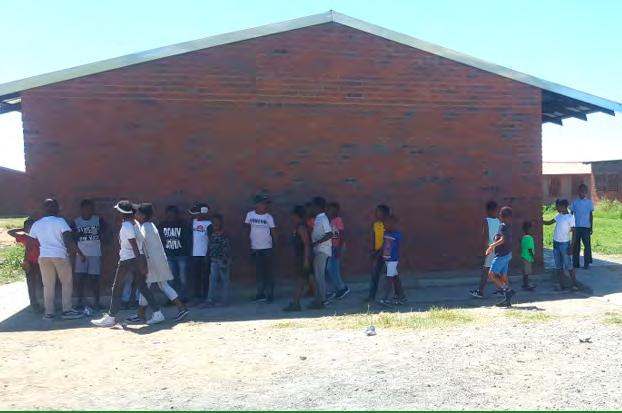
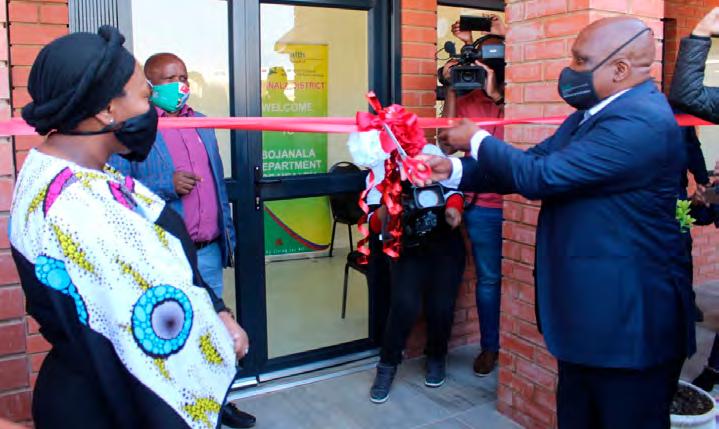
Above: Deputy Minister of Health Joe Phaahla and MEC of Health of North West, Madoda Sambatha, receiving the completed Forensic Pathology Mortuary delivered by Sibanye-Stillwater.
Above: Delivery of sanitisers to Job Shimankana Tabane Hospital CEO Mr A Mvula (centre) in Rustenburg as part of the 100 000 litres of sanitisers donated to help in the fight against COVID-19.
and social infrastructure through the delivery of social and labour plans; projects based on the municipal integrated development plans and community needs.
The Group was, like all industries in South Africa, severely impacted by Covid-19. Its operations were halted during the last week of March 2020 and limited underground production only resumed from May 2020. The Group has focused its efforts on the safe ramp-up of production from its operations since May, adopting a gradual, phased return to work programme to protect the health and safety of its employees as much as possible.
Notwithstanding the operational and financial challenges posed by Covid-19, the Group has continued to provide support to employees, the government and the communities to cushion the impact of Covid-19. The Group has invested R50-million in various initiatives in our doorstep communities and the Eastern Cape to assist communities and government to deal with the impact of Covid-19 in the areas of health, social relief, education and SMME support. Supporting stakeholders is a natural step given that the company already contributes, in addition to the investment towards Covid-19, over R290-million to socio-economic development in line with our vision of creating superior value for all stakeholders. ■
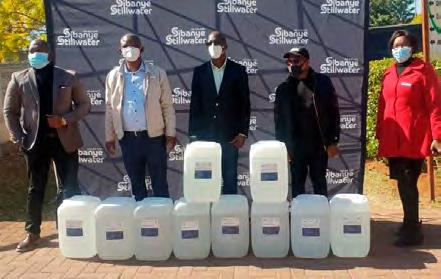
For additional information, please refer to www.sibanyestillwater.com



